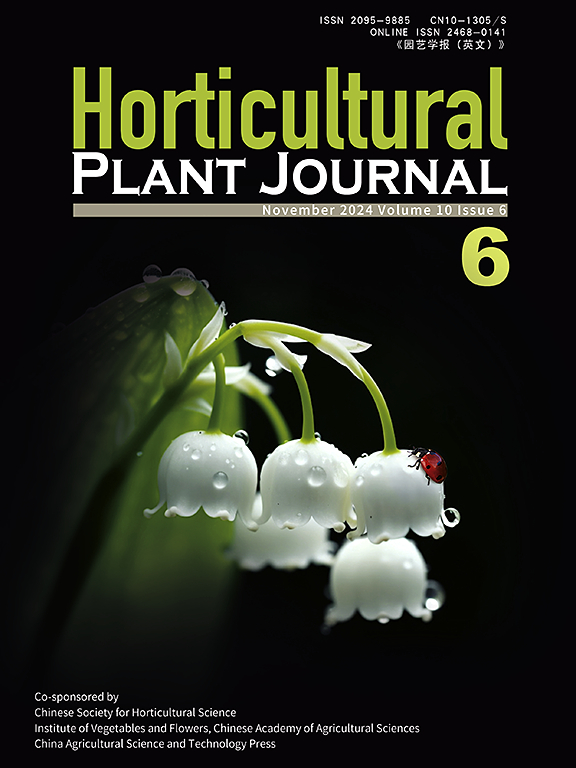SBP transcription factor MdSPL13B positively regulates salt tolerance in apple
IF 6.2
1区 农林科学
Q1 HORTICULTURE
引用次数: 0
Abstract
Salt stress has a major effect on the quality and yield of crops, and many transcription factors (TFs), such as WRKY, NAC, and ERF TFs have been shown to participate in the regulation of salt stress. Squamosa promoter binding protein-like (SPL) TFs play a role in plant floral organ development, metal ion responses and disease resistance. However, the precise function of SPL TFs in regulating the salt stress in plants remains unclear. In this study, we investigated the mechanism by which SPL TFs regulate salt stress in apple (收缩压转录因子MdSPL13B正调控苹果耐盐性
盐胁迫对作物的品质和产量有重要影响,WRKY、NAC、ERF等转录因子参与了盐胁迫的调控。Squamosa启动子结合蛋白样(SPL) TFs在植物花器官发育、金属离子响应和抗病等方面发挥重要作用。然而,SPL TFs调控植物盐胁迫的确切功能尚不清楚。本研究探讨了SPL TFs调控苹果(Malus domestica)盐胁迫的机制。MdSPL13B在苹果愈伤组织中过表达,表明其正调控盐胁迫。MdSPL3B的异源转化也在拟南芥和番茄中产生了显著的耐盐性。随后,酵母双杂交实验表明,MdSPL13B可以与MdNAC29和MdPYL4相互作用,并通过双分子荧光互补实验进一步证实了这一点。此外,MdNAC29和MdPYL4在苹果愈伤组织、拟南芥和烟叶中过表达,表明MdNAC29负调控耐盐性,MdPYL4正调控耐盐性。此外,酵母单杂交、电泳迁移率和双荧光素酶试验表明,MdSPL13B可以通过激活MdWRKY100来增强苹果的耐盐性。综上所述,我们的研究结果增强了对MdSPL3B及其靶基因调控苹果耐盐性的认识,并对耐盐苹果的选育具有指导意义。
本文章由计算机程序翻译,如有差异,请以英文原文为准。
求助全文
约1分钟内获得全文
求助全文
来源期刊

Horticultural Plant Journal
Environmental Science-Ecology
CiteScore
9.60
自引率
14.00%
发文量
293
审稿时长
33 weeks
期刊介绍:
Horticultural Plant Journal (HPJ) is an OPEN ACCESS international journal. HPJ publishes research related to all horticultural plants, including fruits, vegetables, ornamental plants, tea plants, and medicinal plants, etc. The journal covers all aspects of horticultural crop sciences, including germplasm resources, genetics and breeding, tillage and cultivation, physiology and biochemistry, ecology, genomics, biotechnology, plant protection, postharvest processing, etc. Article types include Original research papers, Reviews, and Short communications.
 求助内容:
求助内容: 应助结果提醒方式:
应助结果提醒方式:


